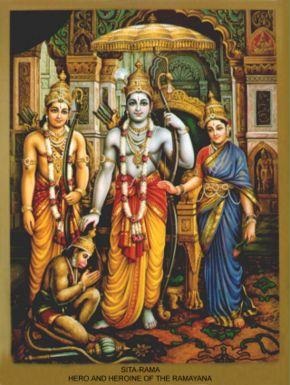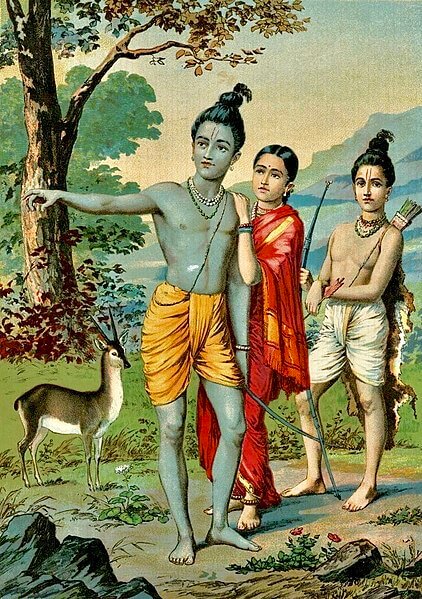Rama was the incarnation of God Maha Vishnu. He had born as the son of king Dasharatha and queen Kausalya at Ayodhya. The history pertains to Treta Yuga. When Rama had completed his basic education under the tutorship of sage Vasishta, another sage, Vishwamitra, had appeared in the court of king Dasharatha and demanded Rama be his apprentice. Vishwamitra had a well-built body; he was also a one-time notorious king. But he decided, in his later life, the knowledge regarding the science of fighting and ability for killing should be abandoned and hence acted as a sage, a propagator of peace. Hence he taught the martial sciences to Rama, where his brother Lakshmana also intended to do his internship with him.

Dasharatha felt happy since his son had got married and deserved to be anointed as prince of Ayodhya. Even though his third wife persuaded him to crown her son Bharata, Rama was ready to keep away and live in forests, due to his good qualities. Bharata had withdrawn from the proposal since he felt he was not in possession of the befitting qualities, suitability, and personality as Rama. The personality of the prince of Ayodhya should be unique, as desired by the people.
Yes, Rama had five fold personalities. In the current age of twenty first century, all young ones must read the Ramayana and to acquaint them, practice the five-fold personality, and get selected to higher managerial or executive posts, to serve the country, and the people at large, in the forthcoming ages, which would elevate the status of this country, would render a seat on the shining row of nations.
वस्त्रेण वपुषा वाचा विद्या विनयेन च । वकार पंचभिर्हीनो नरो नाप्नोति गौरवं ॥
Meaning: Suitable dress code, physically fit body, impressive speech, acquired education, and politeness, these five inherent natures which were the anticipated eligibilities that highlighted Rama as God and better suited for the post of Emperor of Ayodhya. There were many exemplary incidences in the life of Rama, which exhibited all these requisitions fulfilled, a few of which could be seen as below.
Suitable Dress Code
Prior to the day of declaration of coronation Rama, he was wearing the dresses of a prince, in rest in his palace, but immediately on getting the news of exile, for fourteen years, he had undressed the royal robes, and wore the ordinary cloth of saffron color and made ready, with his celestial bow, and tied the quiver having inexhaustible arrows. Sita was also dressed, suitable for the occasion, as if the wife of a Rishi. Lakshmana followed him in assistance and followed the dress code as appropriate for the life of forest people. Even though no luxury ornaments were taken by them, Lakshmana had worn his two ear rings which possessed the power to eradicate hunger and thirst that was necessitated for his life, later. But Rama did not take any special items except his weapon; only to safe guard the Dharma.

The dress code of Rama had influenced Hanuman to a great extent. During the search for Sita by Hanuman, he had to remember the dress and ornaments of Sita. Hanuman remembered the dresses of ladies at hermit as Rama had used identical dresses; Hanuman could distinguish Sita and Mandodari, at night when he saw Mandodari for the first time. Sita was sublime in appearance. She disliked the undeserved luxuries and could wear simple dresses. Ornaments formed part of dresses in the case of ladies and by looking at the anklets of Mandodari, he confirmed her as the wife of Ravana. Hanuman had practiced tactics in combination of dresses and used them as suitable for the occasion. Vishwamitra Rishi used white cloths after he had become a full-fledged Brahmarshi.
Physically Fit Body
The height and weight, the physical cult of the body of Rama was very much impressive. He was healthy in all respects. His body color was bluish and his eyes where glittering when one looked at his face. The hands were large and his limbs were very strong. The body of Rama never sustained any fatigue despite walking bare footed from the Dandakaranya forest to the border of Lanka. Of course, the pure air under the shadows of natural trees and clear water of holy Rivers of India had kept the hygiene of Rama steady and uniform for fourteen years. They were vegetarians in forests. They lived in the proximities of Rishis. Lakshmana could procure fruits and tubers and make ready for the routine worship daily in the morning. Rama practiced fire worship daily sitting along with Rishis. They had slept on the mats made of Darbha grass.
Rama helped the Rishis frequently, by killing the man eaters who appeared and threatened them. The country Panchavati was north to Kishkindha and Vali was ruling the monkey kingdom. Originally, Vali was very helpful to Rishis. One day, one demon called as Dundubhi had threatened the wife of a Rishi and it was reported to Vali. Immediately, Vali chased the demon Dundubhi who was after that lady. The demon left her free and went running inside a cave, and later died, by Vali’s hitting.
Regarding Sugriva, due to some comprehensions, Vali had to fight with him, and as another story; the Rishyamukha Rishi had cursed him, when he tossed the dead body of that demon, which fell in front of the Rishi. The physical body of Sugriva and Vali were alike. In order to distinguish, Rama had put a necklace on Sugriva. Rama had killed Vali. Later Sugriva had offered the necklace to Angada. He had grown physically but in order to acquire the practical knowledge, Angada had to undergo training under Jambhava.
Rama had liked Sugriva due to his various physical guts. He was guiding others and was able to march, showing fearlessness. He had perfect purity of mind. In the past, he had circumscribed the universe several times, and possessed the knowledge of all countries. When Indrajith used the Nagastra weapon against him, his body could withstand the venom of the weapons and he could safely carry the body of Rama and Lakshmana out of the battle field to make them regain consciousness in their military camp. Thus, body with physical fitness, made one’s life always happy.
Speech
The speech of Rama was always found convincing and impressive to all the people within his surroundings. In Dandakaranya forest, when Rama found Agastya Rishi at a distance, he told to Lakshmana, anybody could recognize that Rishi without any introductions, as one could rightly guess by his outlook. Rama used truthfulness in speech and actions. He had composure of mind, and never expected high honors, but kept his honor neat and ever shining. The enmity of enemies could be extinguished when Rama had spoken within his limitations, biased for truth.
The speech of Rama had grabbed the attention of Hanuman. Hanuman had decided to remain with Rama as his servant after the coronation at Ayodhya.
Education
All the Saptha Rishis were respecting Rama for his knowledge and ability to analysis the problems of real life. The seven sages were high scholars of all time. He never visited any township or villages of people’s dwellings. Even at Lanka, when Sugriva had chased Ravana out of his fort, Rama had faced him at Thalaimannar to fight him. Rama didn’t want to kill Ravana. But Ravana didn’t leave his unlawful desire and hence Rama wanted to teach Ravana the lessons of lawfulness and to follow the path of Dharma.
In the representative figure of Rama, one could always observe the well-equipped status of God Rama, with his celestial bow and quiver filled with inexhaustible arrows. He had worshipped the Gods or nature, teachers or parents at right time. When Bharata had brought for him, the royal dresses, he thought they didn’t belong to him then and politely returned it to him. On seeing at a distance, he advised Lakshmana to have a soft approach with Bharata, as he guessed the consequences in advance.
He had granted a long life to Mainda and Dwividha, the duo commandos for their exemplary services towards the cause of Dharma. He praised their education level which kept their life longer to cover in the next Dwapara yuga and bound himself to appear before them. The result had a benefit of protection of cows, called Amrith Mahal, which flourished later in Kishkindha.
Politeness
Rama was eligible to be the Emperor of Ayodhya but was bound to live in the forests with Rishis. Wherever he had gone in the forests or river sides, Rishis had welcomed him and offered food and shelter. Usually, Rama used to send Lakshmana as his messenger or as a servant to get things or works done. But he was very polite in dealings with Scholars.
When Rama wished to visit Sharabhanga Rishi, Rama told to Lakshmana to wait with Sita and visited Sharabhanga Rishi himself. Sharabhanga was fed up by the disturbances of demons in Dandakaranya and willing to be elevated to heaven, was waiting to see Rama with his own eyes before sacrificing his body into the fire. On seeing Rama, he declared his desire to enter heaven and appreciated the politeness of the prince of Ayodhya, Rama.
Later, he visited a number of Rishis, including Agastya Rishi, and due to his polite virtues, he got from Agastya Rishi additional bows, quivers and long, gold handled sword. His influence had also induced politeness in Sita and she told him not to use weapons, but to use for self-defense only. Finally, Rishi Sutheekshna requested them to live themselves in Panchavati in a hermit. He practiced non-violence and convinced Sita. He got many material donations as charity, but returned them to the Ashrams of Rishis. They lived in Panchavati like Rishis.
विर राज महाबाहु श्चित्रया चंद्रमा इव । लक्ष्मणेन सह भ्रात्रा चकार विविधाः कथाः ॥
Meaning: One day at Panchavati hermit, the large armed prince, Rama was sitting with his wife Sita. They were shining like the full Moon on the sky along with the star Chitra (Spica). With brother Lakshmana, he had told many stories.
That was the sensitive moment in Ramayana, or say, the moment that had kindled the jealousy in the heart of Surpanakha, had a look at that scenery, and made up her mind to get Rama as her husband, and acted as a lady of strong will, took the rebirth as Kubja in Dwapara yuga and finally succeeded to marry the God to be one of the 16008 wives of the incarnation as Krishna.
Rama liked the sincere devotee, Shabari. He appreciated her abilities to control senses like Mathanga Rishi, and behaved friendly with plants and animals.
Ahalya or Sampati had got their life again by Rama and he loved all animals.
One could repeatedly recite the name of Rama thousand times and the same would be fetching the virtues as reciting the thousand names of God Vishnu.
It is humbly prayed for the blessings of God Rama upon us.
Next post, being Freedom in Ramayana may not be missed. Civil Engineering in Ramayana would be presented separately in another article.
Readers may provide feedback and share this story with friends and family.

0 Comments
1 Pingback